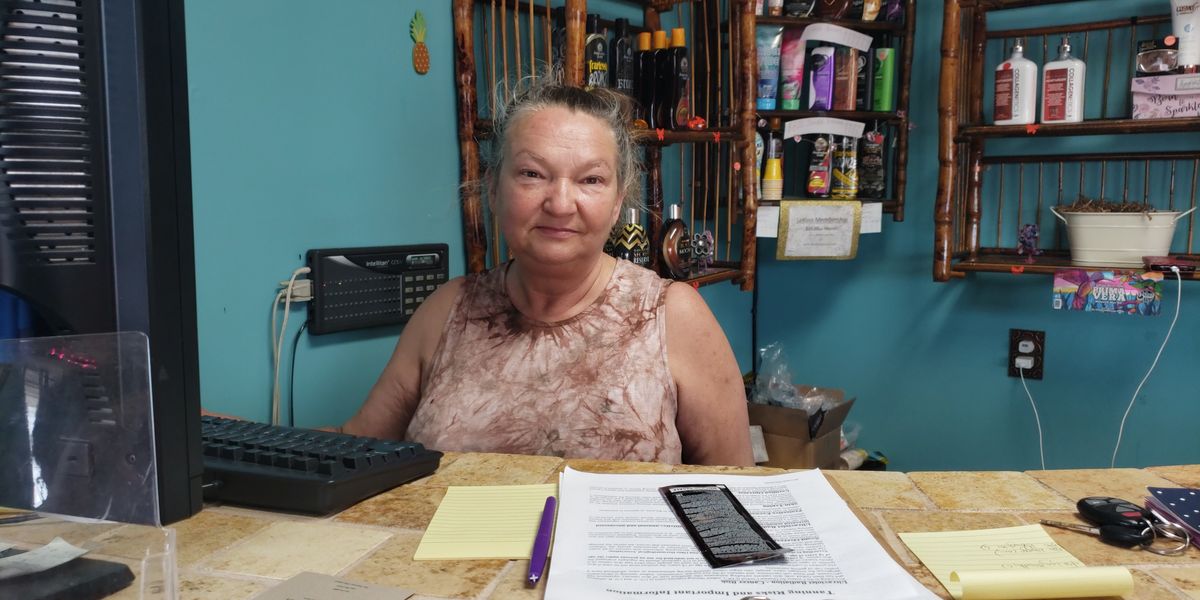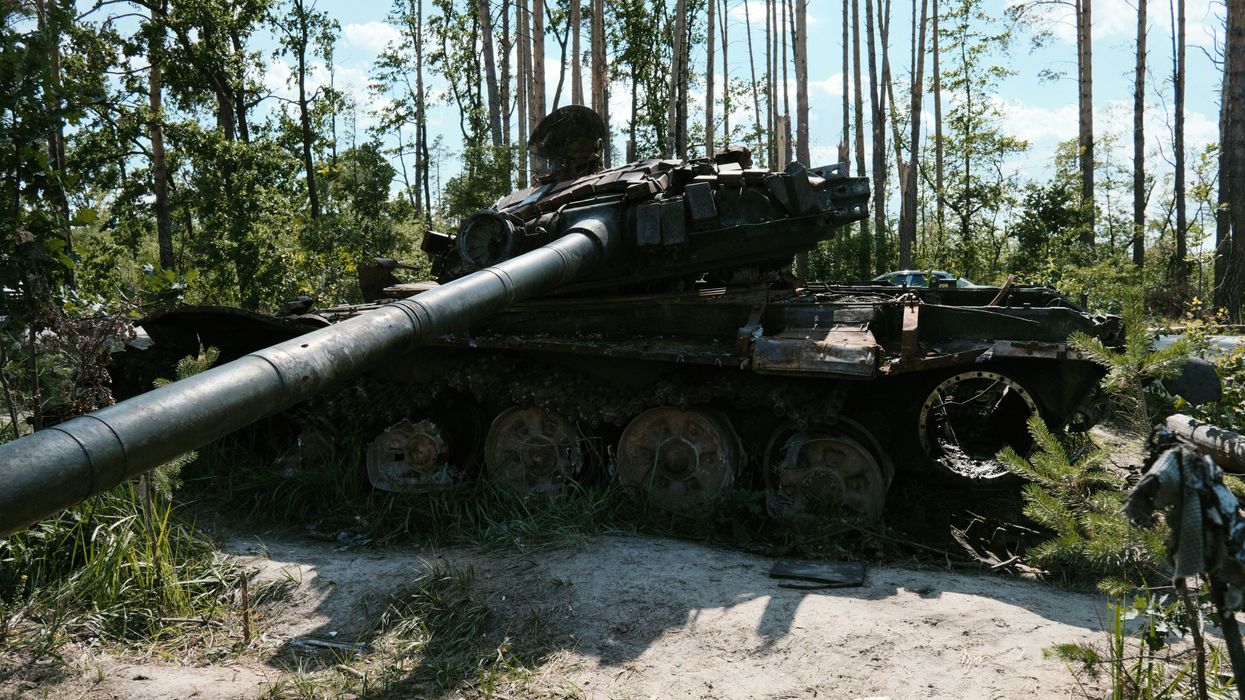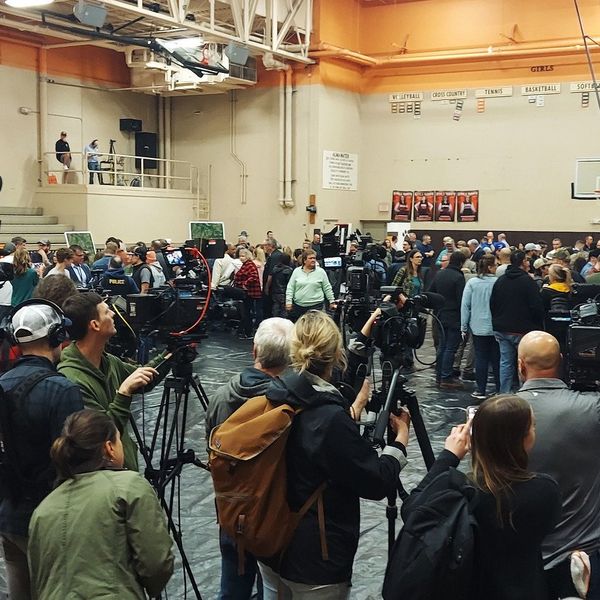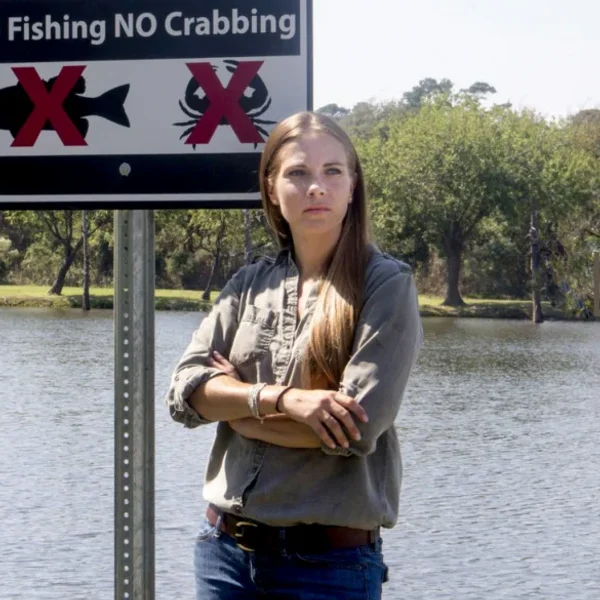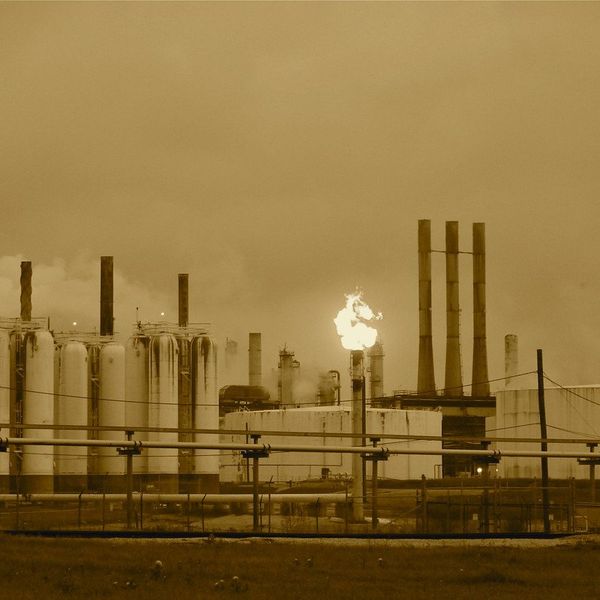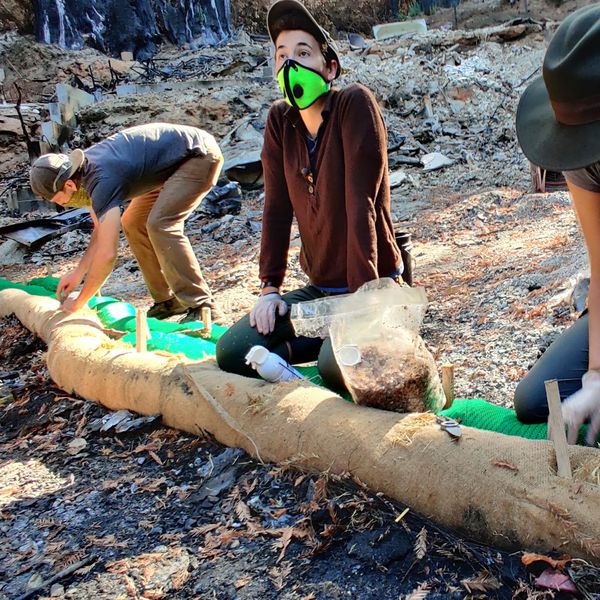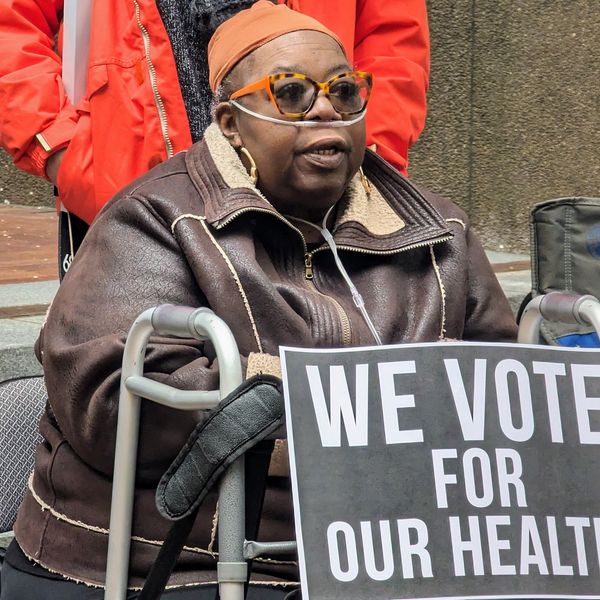EAST PALESTINE, Ohio — Gary Chirico pulled up to the First Church of Christ in a dust-coated minivan. The grey-bearded building maintenance worker surveyed a wall of boxes, filled with bottles or cans of water.
“Any gallon jugs?” Chirico, 59, asked Mallory Aponick, the church’s disaster relief coordinator.
“I think the gallon jugs are done,” she said.
The choices on this day in late May were plastic bottles or canned water, packaged in cases by Molson Coors.
“I like the aluminum cans,” said Chirico with a grin. “It feels like I’m drinking a beer.”
Chirico spoke like a connoisseur of bottled water — and in the four months since a train derailment forever changed this village of 4,700, his family and many other residents rely on it. A steady stream of vehicles flowed through the church’s back lot. Aponick helped load boxes into them. She said the supply of water on hand — donated by various nonprofits, stacked six feet high and stretched along the back of the building — will probably last three days.
It felt like East Palestine’s rebuke of assurances from authorities that their water, and their town, is safe.
On Feb. 3, a Norfolk Southern train carrying a long list of toxic chemicals — including vinyl chloride and benzene— caught fire as it approached the town. The train derailed and the cars burned for three days.
Some testing done by the U.S. Environmental Protection Agency (EPA) has shown levels of toxics that are higher than average and independent researchers insist they are collecting concerning samples around town.
Gov. Mike DeWine’s office, the EPA and the CEO of Norfolk Southern all said that air and water tests detected no signs of toxic chemicals in concentrations that would hurt human health.

Boxes of donated bottled or canned water stand beside the First Church of Christ in East Palestine, Ohio.
Credit: Nick Keppler for EHN
Yet residents got sick, they say, reporting headaches, rashes and respiratory problems.
Some have not returned out of fear and are living indefinitely with friends, family or in hotels. The divide between how they feel (or how their neighbors feel) and what they’ve been told has deepened their distrust of Norfolk Southern, which is responsible for the cleanup, and the EPA, which is managing the environmental hazard.
Months later, the constant movement of trucks and equipment and appearance of mysterious new devices around town still create frustration and confusion. As Norfolk Southern makes promises big and small — vowing to pay to make up for diminished home values and sponsoring the annual street fair — residents don’t know exactly what costs they can bill to the company.
For many, the future seems as hazy as it was when plumes of black smoke loomed over their town.
“My stomach hurts. My face hurts. It’s just constant pain”
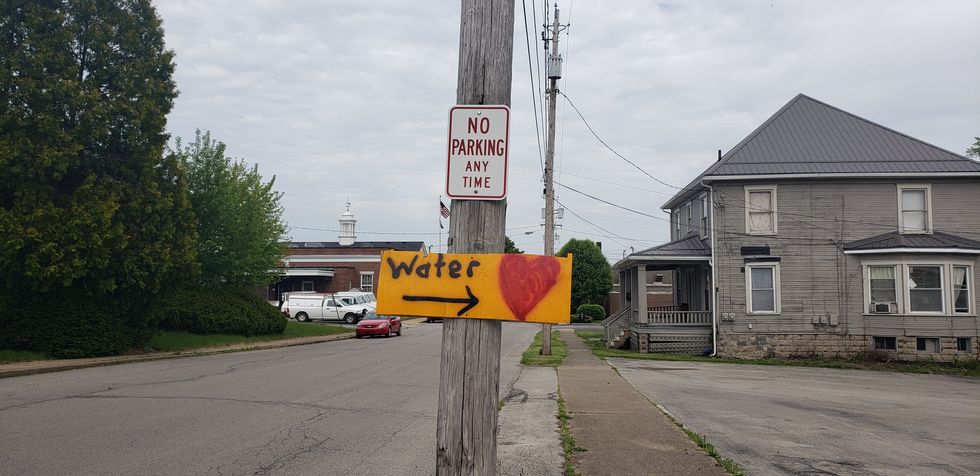
A sign in East Palestine, Ohio, points towards the free water distribution at the First Church of Christ.
Credit: Nick Keppler for EHN
Chirico grabbed cases of cans. He is staying with his sister-in-law miles away from East Palestine, but he isn’t taking any chances.
On Feb. 3, he, his wife and their grandson fled the smoke blowing through their house. His wife developed skin rashes, he said, and he a sore throat. A doctor couldn’t diagnose them with anything but said there was “something bad” in the back of his throat.
Before picking up water, Chirico checked on the house. It still has a gas smell, he said. He doesn’t know when they will live there again. “I can’t plant my garden,” he told EHN. “The first time in 30 years.”
He’s not the only exile.
Courtney Miller, a 35-year-old mother of two, told EHN that she left East Palestine in mid-March due to nausea and burning skin. With two bags of belongings, she is staying with a rotation of friends in neighboring counties.
“My stomach hurts. My face hurts. It’s just constant pain,” Miller said.
Miller immediately distrusted guarantees that the town was safe and rushed to help some independent researchers and right-wing social media figures who descended on the town. She appears in a viral video throwing a rock into a creek and unleashing an oily, rainbow-hued mass.
She also collected water samples in the creek. She now thinks she’s paying for that exposure.
Rose Tellus, 69, drove by the First Church of Church to pick up another item that’s being offered for free, an air purifier. She hopes it will help in her daughter’s home.
Her daughter attempted to return to East Palestine a week after the derailment. “Her skin started burning,” Tellus told EHN, “I had to take her to urgent care. The doctor said, ‘You need to get out of there.’ She had gotten this big blotch on her skin.” She has been staying in a hotel since.
No answers on health concerns

A Norfolk Southern train passes through East Palestine, Ohio.
Credit: Nick Keppler for EHN
The EPA can’t answer questions about personal health. A crowd came to a March town hall with questions about their symptoms. Supervisory engineer Mark Durno, the EPA’s representative to the town, told them, “I can’t answer all your questions. I certainly can’t answer your health questions.”
The federal agency with that mandate, the Centers for Disease Control, is giving assistance to local health officials, but its presence in town has been less than reassuring. Seven members of its own 15-person team reported getting sick while investigating the derailment.
In an email to EHN, DeWine’s press secretary, Dan Tierney, suggested residents take their concerns to the free health clinic opened in February.
“While no levels are being detected that would cause short-term or long-term health problems, seeing a physician is the only way to determine if symptoms are related to derailment chemicals or are of health concern,” he wrote.
For displaced residents, Norfolk Southern is paying some costs of hotel stays, travel and other expenses. Since February, the company has operated an “assistance center” in a church five miles outside of town, to which residents have frequently schlepped carrying receipts.
But as the months pass, along with derailment-related costs, it’s not clear what bills the rail conglomerate will foot.
Tellus said that Norfolk Southern has been paying for her daughter’s hotel stay and other expenses. She drained her own savings to pay for professional cleanings of her and her daughter’s homes, plus the removal of carpets and furniture she thinks were contaminated.
She said she went to the assistance center to ask about reimbursement. “They said, ‘We’re not there yet.’”
In an email to EHN, a company spokesperson wrote that Norfolk Southern “continues to reimburse residents for reasonable expenses related to the derailment through the Family Assistance Center.”
He did not respond to a follow up asking what constitutes a “reasonable expense.”
Businesses suffer
Businesses are hurting too.
Susan Reynolds, who owns the Dunes Tanning Salon and the Muscle Works Gym, said foot traffic has decreased by 50% at both since the derailment.
“My numbers were just heading to where they were pre-Covid,” Reynolds, 58, told EHN while at the front desk of the tanning salon, surrounded by beach-themed decorations. She doesn’t blame customers. Trucks from the clean-up site go past “carrying who knows what,” she said.
Rich Kaufman, a longtime employee of Doyle’s Fresh Meat & Deli, said business has been on the decline, particularly from customers who used to come from neighboring towns.
“People call and ask if the meat is okay,” he said. “I tell them, ‘We don’t raise it out back.’”
Norfolk Southern’s financial obligations will almost inevitably be decided in a class action lawsuit. Each Monday, the town library holds a “Norfolk Southern litigation Q&A.”
Some residents struggle to keep up with the pace of changes. Dirt and train parts are hauled out of town. New hazards enter their mind; excavation on the tracks recently kicked up asbestos. New pieces of equipment suddenly show up on the streets and others vanish.
“There have been a lot of changes since we first got back and it’s hard to keep up,” Angel Felger, 22, who works at the town’s McDonalds and lives with her mother, told EHN. Felger stopped by the church after her shift to pick up more bottled water.
“There were a bunch of things over the drains, like, so water couldn’t get out,” she said. (An EPA representative confirmed that Norfolk Southern installed storm water drain mats to prevent dirt and gravel uprooted by the cleanup from clogging pipes.)
“Some people just throw out all their belongings,” she added.
- After the eighth catastrophic train derailment in the greater Pittsburgh area in five years, advocates demand better protections ›
- Toxic vinyl chloride is a widespread environmental injustice ›
- The EPA has disclosed additional, concerning chemicals released during the train derailment in East Palestine, Ohio ›
- WATCH: The aftermath of the East Palestine, Ohio, toxic train derailment ›
- East Palestine 6 months later: Health issues persists and answers are elusive - EHN ›
- Ohio derailment reveals gaps in public health response to chemical emergencies, experts say - EHN ›
- Some East Palestine residents want the EPA to test inside their homes. EPA says 'no.' - EHN ›
- Court gives preliminary approval of $600 million settlement for the East Palestine train derailment - EHN ›

